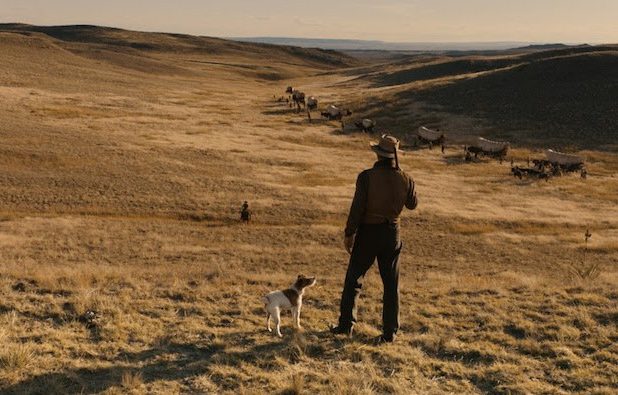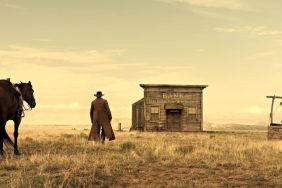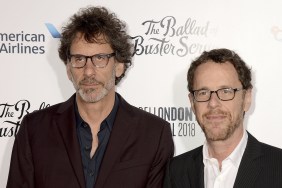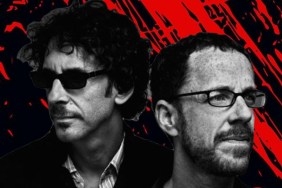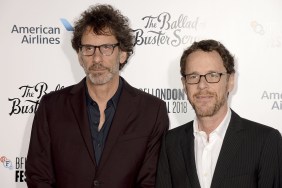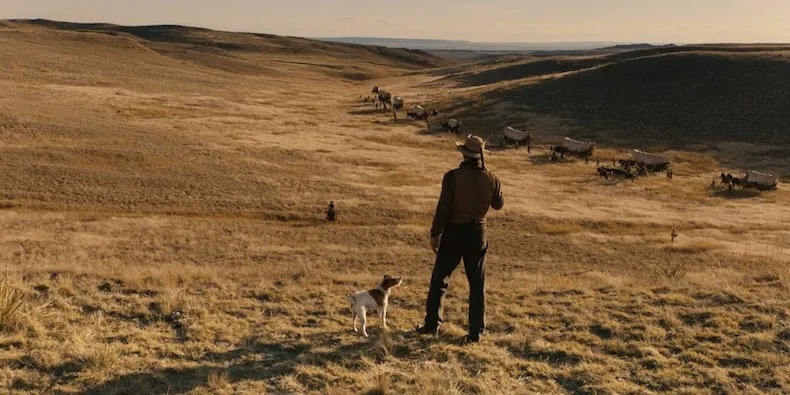
Nearly every time I watch a Coen brothers film, the same thought passes my mind: “These guys get it.” The implication barely under the surface is, of course, that they are showing me something that fascinates me, and something that I agree with. They seem to think that the world—and America especially—is populated with liars and grifters and people looking to get one over on you to raise their own standing. Whether it is David Huddleston’s titular Jeffrey “the Big” Lebowski, parading as a wealthy man of industry through an inheritance from his deceased wife; or George Clooney’s Everett McGill, convincing the other members of his chain gang to become fugitives on the false promise of treasure; liars and grifters are integral of the DNA of their filmography. With real-world news cycles frequently dominated by public figures found out to be frauds—I am inclined to agree with the Coens on the issue.
I say all that to say: it makes perfect sense why they would take this opportunity to return to the Old West. This ideology fits perfectly in the world of outlaws and nomadic sideshow purveyors. It is a breeding ground for self-interest above all else and the mistrust that comes with it. No matter who you are in the American frontier, you should probably be keeping an eye out for the next snake oil salesman. But don’t forget to look over your shoulder too—lest someone shoot you in the back. You may be the greatest gunslinger this side of the muddy Mississippi, but you can bet your bottom dollar that another trigger-happy highwayman is hot on your tail.
The Ballad of Buster Scruggs is something of a mixed bag—with six unconnected vignettes of varying length—it isn’t quite a conventional film, but it is hardly a television show either. I do not intend to take the time to hand-wring about the arbitrary distinctions between a film and a series, nor do I feel the desire to spend all the much time worrying over the era of instant streaming services changing the way media is released. These are valuable conversations, of course, but for a different time and place. All that to say, it seems unlikely that this anthology film would have performed well at a conventional box office. According to the Coens themselves, some of these stories have been on the shelf for 25 years.
On one hand, it is difficult to draw one single conclusion from this piece due to its construction as a series of chapters with no superficial connection. On the other, The Ballad of Buster Scruggs is long and far-reaching enough that just about any common motif of the Coen brothers can be found within one or more of the stories. A world occupied by grifters, liars, outlaws and killers is but one.
The film plays into the Coen brothers’ fascination with mythology. Long has myth and folklore been a hobby horse of theirs—even aside from O Brother Where Art Thou, their explicit adaptation Homer’s The Odyssey. They love allegories and they love folk heroes. The Big Lebowski is modern folklore, with Jeff Bridges’ “The Dude” as the hero at the center, called to action because someone ruined his rug. In a similar way, Oscar Isaac’s folk singer Llewyn Davis is a sort of tragic figure, one who endlessly wanders from one friend’s couch to another’s, hoping for a breakthrough in the music scene. Once again, the setting is apt. From Pecos Bill to Calamity Jane—American folklore has often been the domain of the Wild West.
In walks a new member of the American mythical canon: Buster Scruggs, played by Tim Blake Nelson. Dressed in crisp white, he moseys from tavern to tavern, talking to the audience and singing to his horse. As he makes ever more improbable kills with his six-shooter, his unassailable positive attitude makes for a strange juxtaposition against the brutal reality of his occupation. It is as near cartoony as anything the Coen brothers have ever done—reminiscent of the mid-century Disney animated shorts about Johnny Appleseed, Casey Jones and Paul Bunyan, albeit appropriately more nihilistic. Thematically speaking, its Looney Tunes-esque energy makes for strange bedfellows with the rest of the stories, but it is such a valuable entry to the Coens’ filmography.
Uneven though the chapters might be, it feels right to watch The Ballad of Buster Scruggs in a single sitting rather than episodically. This character dies, that character dies, and so on. There are a thousand ways to die, and even more on the untamed frontier. It has a cumulative effect that works to the benefit of the audience. Though the digital film is sometimes grating on the eyes, other times it is picturesque. At one point or another within each chapter, the Coens and cinematographer Bruno Delbonnel offer barely-moving shots of the film’s subjects in the foreground and unspoiled frontier in the background. It is almost like looking at a painting. Sure, there is perhaps nothing new offered by the duo, thematically speaking. What else is there to say if you are the Coen brothers? Your legacy as noteworthy American filmmakers has long been secured. Just keep telling stories.
Not every story in The Ballad of Buster Scruggs features a folk hero, an outlaw or a grifter. Sometimes it’s another favorite character of the Coens: some poor schmuck who was dealt a bad hand. That said, there may be one idea that connects all six of these yarns. It is the same theme that brings together every film the Coen brothers have made in their three-plus decades in the industry. Tragedy and comedy are not separate genres. They are not even two sides of the same coin—they exist together at every moment. There is something kind of sad about comedy, and in tragedy, there is something kind of funny.
